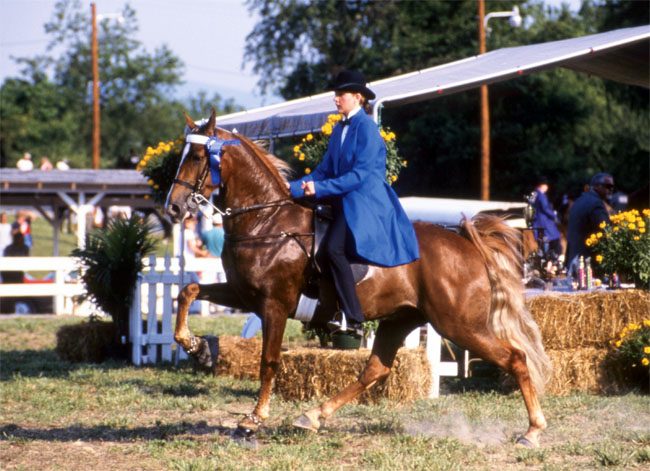Just weeks after bipartisan legislation that aims to end horse soring was reintroduced in the United States Senate, an alternative bill has been authored to accomplish the same goal while also “preserving the Tennessee Walking Horse tradition.”
Tennessee Republicans Sen. Lamar Alexander and Sen. Marsha Blackburn acknowledged the practice of soring horses when introducing Senate Bill 1455, but as they have in previous legislative attempts, drew parallels to the use of banned substances in professional sports.
“In baseball, if a player illegally uses steroids, you punish the player — you don’t shut down America’s pastime,” Alexander echoes when discussing the latest legislation. “We need to punish and stop any trainer, owner or rider who engages in the illegal practice of horse soring — not shut down a treasured and important tradition in both Tennessee and Kentucky. Just as there is zero tolerance in baseball, there should be zero tolerance in horse soring.”
Soring is the intentional application of substances or devices to horses’ limbs to inflict pain in order to achieve a high-stepping gait in show rings.
“This legislation is a proposal to end the contemptible, illegal practice of horse soring, while preserving the century-old Tennessee Walking Horse tradition,” Alexander says. “It would do that by improving the consistency of inspections and regulations and enhancing accountability.”
It’s not clear at this time how Alexander and Blackburn intend to accomplish their goal as the text of S.1455 has not been released. The bill, which would amend the Horse Protection Act if enacted into law, has been referred to the Committee on Commerce, Science and Transportation.
The introduction of the legislation comes 6 weeks after S.1007 — also known as the Prevent All Soring Tactics (PAST) Act — was re-introduced in the Senate by Sen. Mark R. Warner, a Virginia Democrat, and Sen. Mike Carpo, an Idaho Republican. The bill is identical to House Bill 693, which was reintroduced Jan. 31, 2019, by Rep. Kurt Schrader, an Oregon Democrat, and Rep. Ted Yoho, a Florida Republican. Both Schrader and Yoho are veterinarians.
Both PAST Acts aim to prohibit the use of action devices, “weighted toe, pads, wedge, hoof band, or other device or material at a horse show, horse exhibition, or horse sale or auction that is placed on, inserted in, or attached to any limb of a Tennessee Walking Horses, racking horses, Spotted Saddle Horses … to artificially alter the gait of such a horse; and is not strictly protective or therapeutic in nature.”
The PAST Acts define action device as “any boot, collar, chain, roller, or other devices that encircles or is placed upon the lower extremity of the leg of a horse in such a manner that it can rotate around the leg or slide up and down the leg, so as to cause friction; or strike the hoof, coronet band, fetlock joint, or pastern of the horse.” The legislation does not consider soft rubber or soft leather bell boots or quarter boots that are used to protect the foot as an action device.”
Alexander and Blackburn have maintained in previous attempts to pass similar legislation that the competing PAST Act is too heavy-handed and would result in the demise of the Tennessee Walking Horse industry. They point out that there were more than 200 shows and more than a quarter of a million Walking Horses registered in the U.S. in 2018. The industry supports more than 20,000 jobs across the country and accounts for $3.2 billion in the economy.
“The Tennessee Walking Horse industry plays a vital role in our state’s agricultural economy,” Washburn says. “It is time to address the need for common-sense reform to stop the abuse of our beloved Walking Horses and to implement inspection and testing methods to eliminate these problems for good. The creation of a single Horse Industry Organization [HIO] will establish consistency and improve accountability within the industry.”
HIOs self-police soring infractions during the inspection process, which has proven controversial with critics claiming that they are not effective enough. Those claims have been bolstered by a U.S. Department of Agriculture (USDA) Inspector General report that found that the practice persists despite inspections before shows, exhibitions, sales or auctions.
The PAST Acts both intend to establish a new system for inspecting horses for soring by eliminating the self-policing. It would require the USDA to assign a licensed inspector when the show’s management indicates its intent to hire one. Licensed or accredited veterinarians would be given preference for these positions.
If enacted into law, the penalties will be increased from a misdemeanor to a felony. If convicted, a violator could be sentenced to up to 3 years of incarceration and levied fines ranging from $3,000 to $5,000 per offense. Three-time violators would be permanently disqualified from participating in horse shows, exhibitions, sales or auctions.
It's not clear how S.1455 will aim to reform the HIO system.








